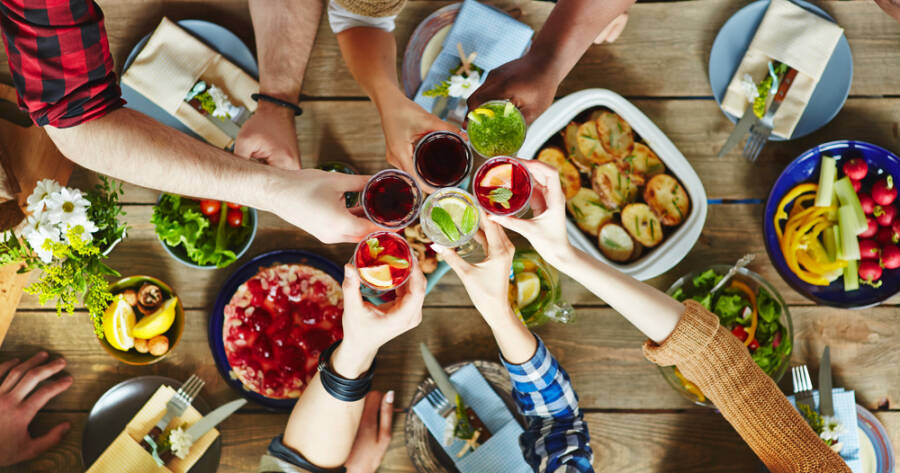In 2025, the food and beverage industry will evolve to meet changing consumer preferences, technological advancements, and sustainability. Trends will reflect growing health awareness, environmental concerns, and a desire for unique, innovative culinary experiences.
1. Functional Foods for Mental Health
With wellness taking center stage, functional foods aimed at improving mental health are expected to dominate in 2025. People are becoming more conscious of the connection between diet and mental well-being, seeking foods that promote cognitive health, stress reduction, and mood enhancement. Ingredients like adaptogens, such as ashwagandha and reishi mushrooms, and mood-boosting superfoods, such as cacao and matcha, are likely to become more common. These foods may be found not only in supplements but also incorporated into snacks, beverages, and even main courses as consumers prioritize foods that offer a sense of calm and clarity.
2. AI-Driven Personalized Nutrition
Artificial intelligence is revolutionizing how we approach food, and personalized nutrition is at the forefront of this movement. By 2025, AI-driven dietary recommendations are expected to be widespread, offering consumers a tailored eating plan based on their genetics, health data, and personal preferences. Apps and gadgets that assess nutrient levels, track eating habits, and provide real-time feedback on what to eat will be more accessible, helping people achieve their health goals with customized food solutions. Personalized nutrition will make it easier to optimize diets for energy, immune function, and overall well-being.
3. Lab-Grown Seafood
With growing concerns over the environmental impact of overfishing, lab-grown seafood is poised to make significant strides in 2025. Cultivated seafood, which involves growing fish cells in a controlled environment without the need for actual fishing, offers a more sustainable and ethical solution. Products like lab-grown salmon, tuna, and shrimp are expected to hit the market, providing an alternative for those who love seafood but want to minimize their environmental footprint. This trend aligns with a broader movement towards alternative proteins that address sustainability and food security concerns.
4. Plant-Based Comfort Foods
Plant-based eating continues to expand, but 2025 will see a twist: plant-based comfort foods. Consumers are seeking familiar, hearty meals that are both indulgent and meat-free. Expect to see plant-based versions of classic comfort foods like mac and cheese, lasagna, fried chicken, and hearty stews becoming more popular. Brands are developing plant-based products with better textures, richer flavors, and enhanced nutritional profiles to satisfy those who want comfort food without compromising on their dietary choices. Innovations in food technology are also allowing for more convincing meat and cheese substitutes, making plant-based comfort foods just as satisfying as their traditional counterparts. Restaurants are increasingly adding plant-based comfort options to their menus, giving consumers more choices when eating out, while home cooks are embracing new plant-based recipes that blend nostalgia with healthy eating. This trend will make plant-based eating more accessible and appealing to a broader audience, including those who are not strictly vegan or vegetarian.
5. Alcohol-Free Spirits and Sophisticated Mocktails
The sober-curious movement is gaining momentum, and by 2025, alcohol-free spirits and sophisticated mocktails will be mainstream. People are looking for more inclusive drink options that allow them to enjoy social gatherings without alcohol. Non-alcoholic spirits, craft sodas, and mocktails made with complex flavors and high-quality ingredients will be featured in bars and restaurants. Brands are focusing on creating nuanced, adult flavors that provide the same social experience as traditional cocktails, without the alcohol content. The use of botanicals, exotic fruits, and spices is allowing for the development of unique non-alcoholic beverages that deliver depth and complexity, making them just as exciting as alcoholic drinks. Expect to see more premium alcohol-free products and beautifully crafted mocktails that cater to sophisticated palates, providing a true bar experience without the buzz. This shift is not just about health—it’s also about creating an inclusive environment where everyone can enjoy flavorful drinks, regardless of their choice to consume alcohol.
Shaping the Future of Food and Drink
The food and drink trends of 2025 reflect a world that is becoming more mindful of health, sustainability, and the need for personalization. From AI-driven nutrition to plant-based comfort foods and zero-waste practices, these trends are set to shape how we experience food in our daily lives. As we move forward, the focus will be on creating food experiences that are not only innovative and flavorful but also ethical and beneficial for both individuals and the planet.
